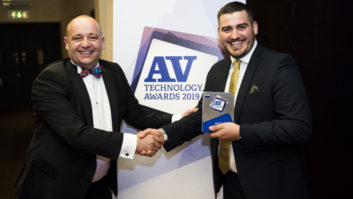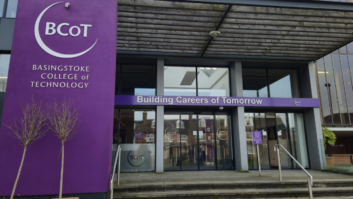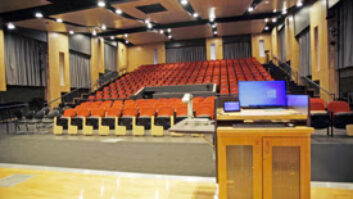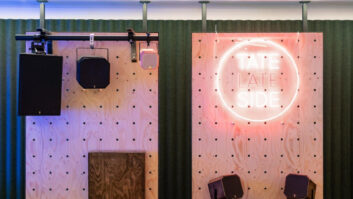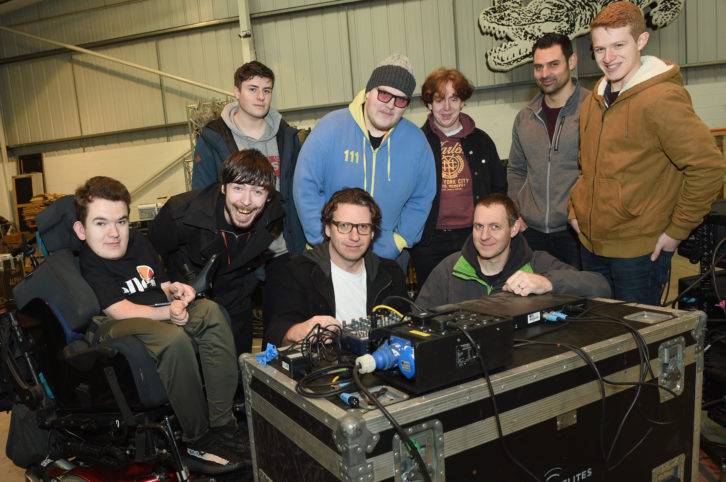
After hearing about a lack of young talent entering the AV industry in his local area, Jack Laidlaw, BSc Music Technology & BSc Audiovisual Technology Programme Leader at Middlesbrough College, decided to do something about it – create the first AV Technology BSc course in the country. Jo Ruddock finds out more
How did the course come about?
We were looking for something new to do and it occurred to us that there was a Venn diagram of job opportunities and things that we’re able to deliver in terms of the staff that we have and the resources that we have, and where we saw the biggest area of growth over the next few years. Right in the middle of that Venn diagram happened to be AV technology. We were hearing evidence from local AV companies in the north-east of England that they were finding it very difficult to recruit enough staff, which seems to be reflective of what’s happening nationally as well.
Since I’ve met various people from AV recruitment companies it seems to be a national trend rather than just a regional thing, whereby there’s far more work than there are people available to do the work. That was all the motivation we needed really to do it. That’s the motivation to make the course happen, but then, of course, you’ve got to be realistic about whether you’re able to deliver it.
We’re quite lucky in that we’ve been delivering Music Technology for nearly 20 years and we’ve got fantastic studio facilities. We also have just validated a Digital Video Production programme, so AV takes some of the Music Tech stuff and some of the Digital Video Production Media-type stuff. We throw in IT programming and projection mapping and then it becomes an Audio Visual Technology Programme.
Did you need to invest in any extra kit to make the course viable?
We did. We bought some additional projectors because we need multiple projectors to do interesting multi-projector projects. We invested in some new cameras as well.
What challenges did you face setting up the course?
We didn’t really face any issues in setting up the course. We got backing from our HE office, which is essentially part of our college which is in charge of HE, straight away because they could see it was an area of growth as well. We developed a course and it was validated by the Open University, so graduates come out with a Bachelor of Science degree with Honours from the Open University. It was all relatively straightforward.
The issue we’re having now is that no one really knows what AV is – on a broad scale. On a broader level, since I’ve started to speak to prospective students about this, I’ve discovered that they don’t know what it is. So we’re working very hard to get that message across.
How are you doing this?
At the minute what I’m able to do to promote the course is to speak to students internally. We have a marketing department here whose responsibility it is to market the course to students outside of the college. On top of that I’m speaking at various different conferences. Jacobs Massey is also promoting the programme on their website, and that’s about as far as I can go at the minute.
It’s becoming apparent that it’s beyond the scope of my role to address the lack of information on a wider scale in terms of what the AV sector is. I can educate the students but I can’t teach everyone in the country what AV is. We’re doing what we can but we have noticed that people don’t know what it is.
In all my time of working in education, in all the programmes I’ve been involved with, to contrast it with Music Technology, for example, Music Tech recruits very healthily. There’s a lot of interest in it – it’s got the word music in it so people know what that is and they can picture a recording studio and that sort of thing. But, when you compare Music Tech to AV Tech, in terms of the direct path to industry there’s such a massive imbalance because there are so many opportunities in AV technology.
At any one time, there’s got to be over 100 open vacancies on various different recruitment websites; there’s nothing like that for Music Tech. There are plenty of opportunities but there’s not an obvious website that I can send graduates to and say ‘go on there, you’ll get a job’. And yet the interest in the courses from a student perspective is completely imbalanced the other way. So there’s something really, really wrong about that.
It seems as if people in AV are aware of it, but how do you address it?
I spoke at the Diversity Conference and a lot of the discussion seems to come back to that point that the industry had an awareness issue.
The course is fantastic, we love it, we think it’s fit for purpose, I can say with 100 percent certainty that our graduates have very good opportunities for jobs and that’s where you need to be in this day and age, especially considering the fees that they’re paying. It’s just getting them here – that’s the challenge.
You have six students so far. Is there scope to extend this in coming years?
It depends who’s interested in doing it. We’ve got the capacity to deliver about 20 students per year; there’s three years on our degree. We would be able to deliver to 20 in year 1, 20 in year 2 and 20 in year 3, so 60 in total but it’s getting them interested and getting them here.
Also we deliver the course but we’re based in a college and there’s a reason for that; there’s a reason that this course hasn’t been delivered anywhere else and that’s because it costs a lot of money to do it. You have to have the resources and you have to commit to run. Whenever you start a new course, particularly with something like AV Technology, which has never been developed anywhere else, it’s going to be low numbers to begin with and you have to have a management culture which is comfortable with that. In a bigger university they wouldn’t run any programme with six students because they want volume and they would be less likely to commit to the amount of resources.
A couple of similar courses have popped up since we started so people are paying attention.
I think the focus for the AV industry needs to be on getting the word out about the jobs, because it’s one thing to say that there’s this course you can do, but really the attractive thing about the AV sector should be the opportunities and the fact that once you’re trained in AV it’s a global language, you can go anywhere in the world with it because it’s needed everywhere.
The opportunities are growing and the workforce is shrinking.
Has the IT-ification of AV had an effect on student awareness of AV as a potential carrer?
From our student point of view that’s a positive because we teach them fundamental processing skills and they can easily transfer those skills over to other areas once they graduate. And they’re skills that are ever-more useful in different disciplines.
So you worked with local AV companies to put the course together?
We did – Nitelites we have really good links with and R&B Group help us out. They’re continuously involved, so our students use their resources – they go to Nitelites from time to time and work in their warehouse. The beauty of that is that they’ve got access to equipment that we could never afford, so they’ve got £2 million worth of line arrays in their warehouse that the students can go and hear and set up. They also get to meet the professionals and that’s how you get work.
